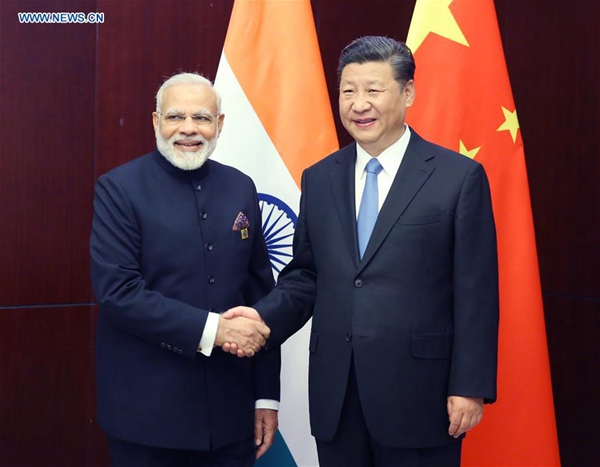Xi-Modi meeting injects vitality into China-Indian relations
- By Rabi Sankar Bosu
 0 Comment(s)
0 Comment(s) Print
Print E-mail China.org.cn, June 15, 2017
E-mail China.org.cn, June 15, 2017
|
|
|
Chinese President Xi Jinping (R) meets with Indian Prime Minister Narendra Modi in Astana, Kazakhstan, June 9, 2017. [Photo/Xinhua] |
In present times, China-Indian ties have gone beyond the bilateral context to acquire a global character. The two countries have been enjoying good communication at many levels and maintaining sound economic and social development despite some friction.
Indian Prime Minister Modi met Chinese President Xi Jinping on the margins of the 17th meeting of the Council of Heads of State of the Shanghai Cooperation Organization (SCO) in Astana, Kazakhstan on June 9, 2017.
This private bilateral meeting was seen as an effort to repair Indo-Chinese ties that have been hit by growing differences over a host of issues including the China-Pakistan Economic Corridor (CPEC) and India's possible membership of the Nuclear Suppliers Group (NSG).
It is the first meeting between the two leaders after India's absence from China's high-profile Belt and Road Forum held in Beijing last month in which 29 world leaders took part. India abstained from the summit to highlight its concerns over the landmark US$50 billion CPEC, which is a part of the Belt and Road Initiative (BRI) and passes through Pakistan-occupied Kashmir (PoK).
During the Astana summit, India and Pakistan became the seventh and eighth members of the SCO. It is important to state that despite India's reservations about the BRI on questions of "territorial integrity and sovereignty," it has now become a part of another China-initiated organization.
At a time of global uncertainties in the face of an unpredictable American administration under President Donald Trump, India and China relations are a force of stability. The meeting between Modi and Xi, lasting 40 minutes, was described as "cordial and positive." It was also felt that, as the world becomes more multi-polar, it is important for India and China to work together more closely.
Hopefully, the two leaders agreed on the importance of this. The meeting also came after President Trump blamed India and China for brokering an "unfair climate deal" while pulling out of the Paris agreement. A sound India-China relationship will help undoubtedly stabilize the volatile international situation.
During the meeting, Modi said India and China should tap their potential in cooperation, strengthen communication and coordination in international affairs, respect each other's core concerns and appropriately handle their disputes.
Xi said the two countries should make joint efforts to promote regional connectivity and shared development, align their development initiatives, advance the building of the Bangladesh-China-India-Myanmar (BCIM) economic corridor within the BRI at an early date, and boost cooperation in the Asian Infrastructure Investment Bank.
Modi acknowledged in a tweet that his discussions with Xi were about "how to improve and further ties." He thanked President Xi for China's staunch support which made possible India's accession to the SCO.
The sense of the meeting was markedly different from when on the sidelines of the BRICS summit in Goa last October, when all the hot-button issues were raised, ranging from NSG to Masood Azhar, head of a terrorist group operating from a Pakistan base.
However, the meeting did not go well since Xi did not yield to Modi's request for NSG membership and Masood Azhar's listing as a terrorist at the UN.
It's really encouraging to see that, during the Astana meeting, the two leaders showed their softening stand to bring down the temperature. The meeting sent out a strong signal that both nations are willing to look at the bigger picture and hedge the ties on increasing trade and people-to-people links while simultaneously trying to keep all channels of communication open.
After Astana, Modi and Xi will meet again at the G20 summit to be held next month in Hamburg, Germany, followed by the 9th BRICS Summit scheduled for September in Xiamen in south China's Fujian Province. These two upcoming multilateral meetings will again give the two nations a chance to improve relations through dialogue.
This is happening at various levels. Indian President Pranab Mukherjee visited China in May last year and Prime Minister Modi has now held three meetings with President Xi since June last year.
The economic and commercial cooperation between the two nations is growing fast. While India is offering support to China's "Going Global" strategy, China has been playing a significant part of Indian developmental missions like "Digital India," "Skill India," "Smart Cities," etc.
Rabi Sankar Bosu, Secretary of New Horizon Radio Listeners' Club, West Bengal, India.
Opinion articles reflect the views of their authors only, not necessarily those of China.org.cn.







Go to Forum >>0 Comment(s)